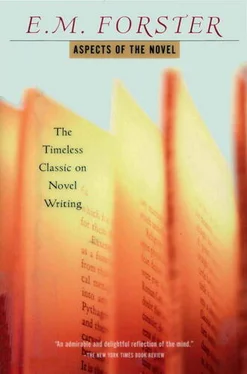Let me quote here for our comfort from my immediate predecessor in this lectureship, Mr. T. S. Eliot. Mr. Eliot enumerates, in the introduction to The Sacred Wood, the duties of the critic. "It is part of his business to preserve tradition—when a good tradition exists. It is part of his business to see literature steadily and to see it whole; and this is eminently to see it not as consecrated by time, but to see it beyond time." The first duty we cannot perform, the second we must try to perform. We can neither examine nor preserve tradition. But we can visualize the novelists as sitting in one room, and force them, by our very ignorance, from the limitations of date and place. I think that is worth doing, or I should not have ventured to undertake this course.
How then are we to attack the novel—that spongy tract, those fictions in prose of a certain extent which extend so indeterminately? Not with any elaborate apparatus. Principles and systems may suit other forms of art, but they cannot be applicable here—or if applied their results must be subjected to reexamination. And who is the re-examiner? Well, I am afraid it will be the human heart, it will be this man-to-man business, justly suspect in its cruder forms. The final test of a novel will be our affection for it, as it is the test of our friends, and of anything else which we cannot define. Sentimentality—to some a worse demon than chronology—will lurk in the background saying, "Oh, but I like that," "Oh, but that doesn't appeal to me," and all I can promise is that sentimentality shall not speak too loudly or too soon. The intensely, stifling human quality of the novel is not to be avoided; the novel is sogged with humanity; there is no escaping the uplift or the downpour, nor can they be kept out of criticism. We may hate humanity, but if it is exorcised or even purified the novel wilts; little is left but a bunch of words.
And I have chosen the title "Aspects" because it is unscientific and vague, because it leaves us the maximum of freedom, because it means both the different ways we can look at a novel and the different ways a novelist can look at his work. And the aspects selected for discussion are seven in number: The Story; People; The Plot; Fantasy; Prophecy; Pattern and Rhythm.
WEshall all agree that the fundamental aspect of the novel is its story-telling aspect, but we shall voice our assent in different tones, and it is on the precise tone of voice we employ now that our subsequent conclusions will depend.
Let us listen to three voices. If you ask one type of man, "What does a novel do?" he will reply placidly: "Well—I don't know—it seems a funny sort of question to ask—a novel's a novel—well, I don't know—I suppose it kind of tells a story, so to speak." He is quite good-tempered and vague, and probably driving a motor-bus at the same time and paying no more attention to literature than it merits. Another man, whom I visualize as on a golf-course, will be aggressive and brisk. He will reply: "What does a novel do? Why, tell a story of course, and I've no use for it if it didn't. I like a story. Very bad taste on my part, no doubt, but I like a story. You can take your art, you can take your literature, you can take your music, but give me a good story. And I like a story to be a story, mind, and my wife's the same." And a third man he says in a sort of drooping regretful voice, "Yes—oh, dear, yes—the novel tells a story." I respect and admire the first speaker. I detest and fear the second. And the third is myself. Yes—oh, dear, yes—the novel tells a story. That is the fundamental aspect without which it could not exist. That is the highest factor common to all novels, and I wish that it was not so, that it could be something different—melody, or perception of the truth, not this low atavistic form.
For the more we look at the story (the story that is a story, mind), the more we disentangle it from the finer growths that it supports, the less shall we find to admire. It runs like a backbone—or may I say a tapeworm, for its beginning and end are arbitrary. It is immensely old—goes back to neolithic times, perhaps to paleolithic. Neanderthal man listened to stories, if one may judge by the shape of his skull. The primitive audience was an audience of shock-heads, gaping round the campfire, fatigued with contending against the mammoth or the woolly rhinoceros, and only kept awake by suspense. What would happen next? The novelist droned on, and as soon as the audience guessed what happened next, they either fell asleep or killed him. We can estimate the dangers incurred when we think of the career of Scheherazade in somewhat later times. Scheherazade avoided her fate because she knew how to wield the weapon of suspense—the only literary tool that has any effect upon tyrants and savages. Great novelist though she was—exquisite in her descriptions, tolerant in her judgments, ingenious in her incidents, advanced in her morality, vivid in her delineations of character, expert in her knowledge of three Oriental capitals—it was yet on none of these gifts that she relied when trying to save her life from her intolerable husband. They were but incidental. She only survived because she managed to keep the king wondering what would happen next. Each time she saw the sun rising she stopped in the middle of a sentence, and left him gaping. "At this moment Scheherazade saw the morning appearing and, discreet, was silent." This uninteresting little phrase is the backbone of the One Thousand and One Nights, the tapeworm by which they are tied together and the life of a most accomplished princess was preserved.
We are all like Scheherazade's husband, in that we want to know what happens next. That is universal and that is why the backbone of a novel has to be a story. Some of us want to know nothing else—there is nothing in us but primeval curiosity, and consequently our other literary judgments are ludicrous. And now the story can be defined. It is a narrative of events arranged in their time sequence—dinner coming after breakfast, Tuesday after Monday, decay after death, and so on. Qua story, it can only have one merit: that of making the audience want to know what happens next. And conversely it can only have one fault: that of making the audience not want to know what happens next. These are the only two criticisms that can be made on the story that is a story. It is the lowest and simplest of literary organisms. Yet it is the highest factor common to all the very complicated organisms known as novels.
When we isolate the story like this from the nobler aspects through which it moves, and hold it out on the forceps—wriggling and interminable, the naked worm of time—it presents an appearance that is both, unlovely and dull. But we have much to learn from it. Let us begin by considering it in connection with daily life.
Daily life is also full of the time-sense. We think one event occurs after or before another, the thought is often in our minds, and much of our talk and action proceeds on the assumption. Much of our talk and action, but not all; there seems something else in life besides time, something which may conveniendy be called "value," something which is measured not by minutes or hours, but by intensity, so that when we look at our past it does not stretch back evenly but piles up into a few notable pinnacles, and when we look at the future it seems sometimes a wall, sometimes a cloud, sometimes a sun, but never a chronological chart. Neither memory nor anticipation is much interested in Father Time, and all dreamers, artists and lovers are partially delivered from his tyranny; he can kill them, but he cannot secure their attention, and at the very moment of doom, when the clock collected in the tower its strength and struck, they may be looking the other way. So daily life, whatever it may be really, is practically composed of two lives—the life in time and the life by values—and our conduct reveals a double allegiance. "I only saw her for five minutes, but it was worth it." There you have both allegiances in a single sentence. And what the story does is to narrate the life in time. And what the entire novel does—if it is a good novel—is to include the life by values as well; using devices hereafter to be examined. It, also, pays a double allegiance. But in it, in the novel, the allegiance to time is imperative: no novel could be written without it. Whereas in daily life the allegiance may not be necessary: we do not know, and the experience of certain mystics suggests, indeed, that it is not necessary, and that we are quite mistaken in supposing that Monday is followed by Tuesday, or death by decay. It is always possible for you or me in daily life to deny that time exists and act accordingly even if we become unintelligible and are sent by our fellow citizens to what they choose to call a lunatic asylum. But it is never possible for a novelist to deny time inside the fabric of his novel: he must cling however lightly to the thread of his story, he must touch the interminable tapeworm, otherwise he becomes unintelligible, which, in his case, is a blunder.
Читать дальше












